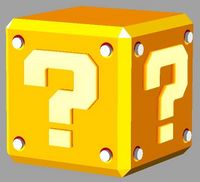Block: Difference between revisions
Time Turner (talk | contribs) |
m (→RPGs) |
||
| Line 12: | Line 12: | ||
==RPGs== | ==RPGs== | ||
In ''Mario'' RPGs, blocks either release items or coins when hit, similar to their platformer role. In most ''Mario'' RPGs, a [[Save Block]] must be hit so the player can save the game. Heart Blocks could also heal the player, sometimes for a fee. [[Super Block]]s and [[Shine Block]]s also play a role in upgrading the abilities of [[partner]]s. In the ''[[Paper Mario]]'' series, [[Yellow Block]]s and [[Stone Block]]s are obstacles that must be shattered by the [[Hammer]] and its upgrades. Yellow Blocks can be destroyed by all hammers, but a [[Super Hammer]] is required to destroy a giant Yellow Block in ''[[Paper Mario: The Thousand-Year Door]]''. In ''Paper Mario'', Stone Blocks are destroyed with the [[Super Hammer]], but are destroyed with the [[Ultra Hammer]] in ''The Thousand-Year Door''. [[Metal Block]]s can be shattered by the Ultra Hammer only in ''Paper Mario''; in ''The Thousand-Year Door'' they usually serve as puzzle elements. | In ''Mario'' RPGs, blocks either release items or coins when hit, similar to their platformer role. In most ''Mario'' RPGs, a [[Save Block]] must be hit so the player can save the game. Heart Blocks could also heal the player, sometimes for a fee. [[Super Block]]s and [[Shine Block]]s also play a role in upgrading the abilities of [[partner]]s. In the ''[[Paper Mario]]'' series, [[Yellow Block]]s and [[Stone Block]]s are obstacles that must be shattered by the [[Hammer]] and its upgrades. Yellow Blocks can be destroyed by all hammers, but a [[Super Hammer]] is required to destroy a giant Yellow Block in ''[[Paper Mario: The Thousand-Year Door]]''. In ''Paper Mario'', Stone Blocks are destroyed with the [[Super Hammer]], but are destroyed with the [[Ultra Hammer]] in ''The Thousand-Year Door''. [[Metal Block]]s can be shattered by the Ultra Hammer only in ''Paper Mario''; in ''The Thousand-Year Door'' they usually serve as puzzle elements. | ||
In ''[[Mario & Luigi: Superstar Saga]]'', the blocks from ''[[Super Mario Bros.]]'', ''[[Super Mario World]]'', ''[[Super Mario 64]]'', and ''[[Paper Mario]]'' appeared together in a room in Woohoo Hooniversity, being studied by the professors. The names of their respective games are mentioned in their descriptions, but the blocks do not give any coins. | |||
==Types of Blocks== | ==Types of Blocks== | ||
Revision as of 04:36, February 28, 2010
You may be looking for the most well-known block, the ? Block, which does not show up properly using the search function.

- “Do you know why blocks exist? For smashing, that's why!”
- —Wario, Wario Land: Shake It!
Blocks are a crucial part of many platformers and RPGs in the Mario series. In fact, they were so successful that blocks are now a great part of the platforming genre for most video game series. Blocks often release coins and items (particularly power-ups) when hit from below or ground pounded from above. Blocks are also commonly used as a platform to get to places, but some such as the Drop Block may have unwanted side-effects when stepped on, making it difficult to traverse them. Blocks have many other uses, they can grow, shrink, recover health, give the player tips or change the level to benefit or harm the player in some way. Some blocks will break when hit, but most will simply become inactive Used Blocks.
Platformers
The first block that appeared was the POW Block in Mario Bros.. The POW Block would damage all enemies on the screen, making it useful if the player got swarmed with enemies. Super Mario Bros. introduced the two most common blocks in the Mario series: the Brick Block and ? Block. Brick Blocks would release coins when broken and were only breakable by Super Mario. ? Blocks would usually release power-ups, such as Super Mushrooms, or Fire Flowers. Brick Blocks and ? Blocks have appeared in almost every Mario platformer since, and new blocks have usually been introduced in every new platformer game, from the ! Block in Super Mario World to the ♩ Block in Super Mario Bros. 3 to the Egg Block in Yoshi's Island.
RPGs
In Mario RPGs, blocks either release items or coins when hit, similar to their platformer role. In most Mario RPGs, a Save Block must be hit so the player can save the game. Heart Blocks could also heal the player, sometimes for a fee. Super Blocks and Shine Blocks also play a role in upgrading the abilities of partners. In the Paper Mario series, Yellow Blocks and Stone Blocks are obstacles that must be shattered by the Hammer and its upgrades. Yellow Blocks can be destroyed by all hammers, but a Super Hammer is required to destroy a giant Yellow Block in Paper Mario: The Thousand-Year Door. In Paper Mario, Stone Blocks are destroyed with the Super Hammer, but are destroyed with the Ultra Hammer in The Thousand-Year Door. Metal Blocks can be shattered by the Ultra Hammer only in Paper Mario; in The Thousand-Year Door they usually serve as puzzle elements.
In Mario & Luigi: Superstar Saga, the blocks from Super Mario Bros., Super Mario World, Super Mario 64, and Paper Mario appeared together in a room in Woohoo Hooniversity, being studied by the professors. The names of their respective games are mentioned in their descriptions, but the blocks do not give any coins.